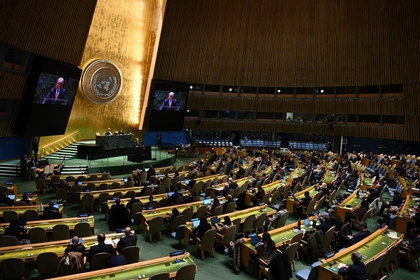In a subtle move that might have signified Russia’s dwindling soft power in post-Soviet states, Kazakhstan President Kassym-Jomart Tokayev conducted his closing speech in Kazakh instead of Russian.
The incident on Nov. 9 led to baffled looks among the visiting Russian diplomats – including Foreign Minister Sergey Lavrov – in their latest diplomatic visit to Astana, the capital of the Central Asian nation.
JOIN US ON TELEGRAM
Follow our coverage of the war on the @Kyivpost_official.
In the video, Tokayev and Putin could be seen sitting on one side facing the delegations and local officials. As they signed the documents and shook hands, two interpreters – Kazakh and Russian – could be seen making the announcements in both languages.
However, as Tokayev started the speech after the formalities, he began talking in Kazakh to the bewilderment of the Russian officials, who reached for their interpreting headsets.
Bakhti Nishanov of the Commission on Security and Cooperation in Europe, described it as a “power move.”
This is an encapsulation of the tables turned in the Kazakhstan-Russia relations: President of Kazakhstan pulls a power move and opens his speech to the visiting Russian delegation headed by Putin speaking Kazakh. You can see the bewilderment and confusion among the delegation pic.twitter.com/fEpJB57frR
— Bakhti Nishanov (@b_nishanov) November 9, 2023
Russian remains a prominent language in Kazakhstan with the majority of Kazakhs being bilingual, and Tokayev could be seen first addressing the delegation as “dear colleagues” in Russian before switching to Kazakh.
However, despite both using the Cyrillic alphabet due to their shared past, Russian and Kazakh belong to entirely different language families and are unintelligible to each other.
In October, Kazakhstan announced initiatives to increase the use of the Kazakh language over Russian in television and radio from 50 to 70 percent.

US Urges Backing of ‘Simple’ UN Resolution as Trump Calls for Putin-Zelensky Talks
In July 2022, Tokayev told Putin directly that he did not recognize the “quasi-state formations” in the Donbas in a public forum. Some have interpreted these moves as indicators of Russia’s dwindling influence in Kazakhstan, a once-staunch ally of Moscow, after Russia’s botched invasion of Ukraine.
Kazakhstan has been a long-time ally of Moscow and was a founding member of the Eurasian Economic Union alongside Russia and Belarus, sharing an integrated single market and removing most trade barriers with the two.
During the latest visit, Russia and Kazakhstan signed agreements on energy, customs and labor issues, with Tokayev claiming “large opportunities for further expansion of the trade volume” as the bilateral trade reached a record $27 billion last year between the two nations.
You can also highlight the text and press Ctrl + Enter











